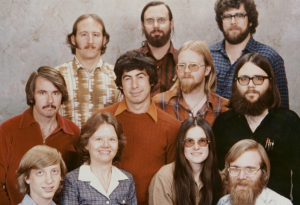Newsletter Archives
-
50 years and counting
 Where were you 50 years ago when Microsoft started? I was in junior high and it wasn’t until high school that we saw our first Basic computer. There was one computer in the math lab and that was it. Now we have the vastly greater computing power in our pockets and in our wristwatches.
Where were you 50 years ago when Microsoft started? I was in junior high and it wasn’t until high school that we saw our first Basic computer. There was one computer in the math lab and that was it. Now we have the vastly greater computing power in our pockets and in our wristwatches.50 years later, Microsoft is holding a Copilot event on the 50th anniversary date (what else do we expect, I guess?)
Where do you think we will be in the next 50 years in terms of computing? I realize that many of us won’t be around to experience the full 50 years! Will we get flying cars? Experience the lifestyle of the Jetson’s? Interestingly enough, we do have many of the technologies that were shown in that classic cartoon show.
What technology do you predict for the next 50 years?
-
Microsoft wants to hear from you

I received this in an email from Microsoft this morning. It does not appear to be an April Fool’s joke. Take the company at its word — if you get this survey request, tell Redmond what you think.
I was struck by two things about the mostly multiple-choice survey. First, most of the available choices tended to favor Microsoft. For example, in a set of five choices, three could be construed as favorable to the company while only two were unfavorable. That’s not balanced.
The other was the following question: “How long have you used Copilot for?” I’m no English savant, but this would not have escaped my attention while editing an article for AskWoody. It would certainly have been rewritten by Roberta Scholz. I decided to ask Copilot to copy edit the sentence and it provided “How long have you been using Copilot?”
This suggests that the survey was written by a human, albeit one whose English-language skills are slightly below average.
-
Reviewing your licensing options

ISSUE 22.13 • 2025-03-31 TAME YOUR TECH

By Susan Bradley
Can you get a license for that?
With the upcoming end of life of Windows 10, I’m often asked why I’m not recommending that you look for and install the long-term servicing channel (LTSC) version of Windows 10 or Windows 11.
LTSC is a version of Windows 10 that was designed for devices that require minimal changes over time. It is primarily used in environments where stability and consistency are crucial, such as medical devices or industrial machinery. It is not available to the public and can be purchased only through volume licensing. It’s a platform that is intentionally not bloated, and it comes with fewer pre-installed apps, such as Microsoft Store, Cortana, and Edge (until the 2021 version). While it gets regular security updates, it does not get feature releases.
Read the full story in our Plus Newsletter (22.13.0, 2025-03-31).
This story also appears in our public Newsletter. -
Where is Windows going?
 When Microsoft started down the road of continuous improvements, it resulted in constant change that can annoy everyone — from end users to IT administrators. When I’m asked, “What’s this,” I must see the desktop to know what the person is talking about. They’re obviously seeing it, but I may never have seen in on my PCs.
When Microsoft started down the road of continuous improvements, it resulted in constant change that can annoy everyone — from end users to IT administrators. When I’m asked, “What’s this,” I must see the desktop to know what the person is talking about. They’re obviously seeing it, but I may never have seen in on my PCs.Yesterday, in the Windows IT Pro blog, Microsoft announced its Windows Roadmap. It covers only Windows 11 23H2 and 24H2. It promises to show when something is in preview, whether it’s a slow rollout, or is in general release. It provides estimated dates.
When that odd thing shows up, perhaps the Roadmap can help all of us figure out whether Windows was always like that, or the odd thing is new. I suppose we can hope.
-
What do we know about DeepSeek?
AI

By Michael A. Covington
On January 27, the Chinese AI company DeepSeek caused so much panic in American industry that NVIDIA stock dropped 17% in one day, and the whole Nasdaq had a 3.4% momentary dip.
What scared everybody? The impressive performance of the DeepSeek large language model (LLM), which competes with ChatGPT, reportedly cost less than a tenth as much to create and costs less than a tenth as much to run.
The bottom fell out of the market for powerful GPUs, at least temporarily, because they don’t seem to be needed in anywhere near the quantities expected.
But what is this DeepSeek, and what do we make of it?
Read the full story in our Plus Newsletter (22.07.0, 2025-02-17).
-
The state of Windows 11

ISSUE 21.52 • 2024-12-23 WINDOWS 11

By Lance Whitney
With Windows 11 now three years old, where does it stand today?
I’ve been running Windows 11 almost since its debut in 2021. At first, I limited it to just test environments. Slowly, I expanded its reach to my two main laptops and a couple of virtual machines. Only my desktop PC is still on Windows 10, mostly so that I can still easily access and use it. But when I replace my desktop next year, the new PC will be running Windows 11.
Here’s my take, based on my own experiences with it — and how I think Microsoft has handled it.
Read the full story in our Plus Newsletter (21.52.0, 2024-12-23).
This story also appears in our public Newsletter. -
Outlook (new) for Windows
MICROSOFT 365

By Peter Deegan
It’s been a big year for the new Outlook for Windows. Microsoft has removed the “preview” tag and is pushing it hard. But is Outlook (new) really ready for the public?
A lot has changed since I gave Five reasons not to use the new Outlook; alas, not enough has changed in those key areas.
Two major Outlook for Windows versions are now available, but they are very different.
Read the full story in our Plus Newsletter (21.49.0, 2024-12-02).
-
Microsoft’s new Master Services Agreement
MICROSOFT

By Will Fastie
Get it while you can.
Microsoft has been notifying users about its updated Master Services Agreement (MSA), which goes into effect on September 30, 2024.
This is not exactly a surprise. Microsoft seems to be on an annual schedule when it comes to MSA changes, although this is not assured. Updates to the MSA are announced in July, giving users two months to review the changes.
Read the full story in our Plus Newsletter (21.36.0, 2024-09-02).


